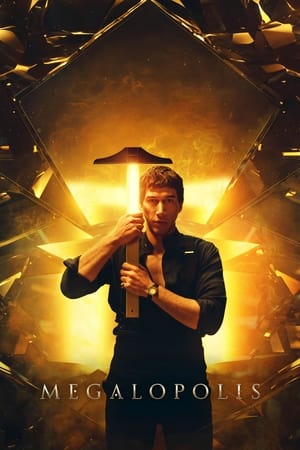
Megalopolis
**_Colorful, eccentric, intellectually heavy and full of pizazz, but not for the masses_** A brilliant architect (Adam Driver) is determined to recreate a core section of New Rome in the later 21st century with a revolutionary bio-adaptive material called Megalon. But the new mayor resists these creative plans because he’s content with the way things are (Giancarlo Esposito). As such, the mayor’s not happy when his daughter (Nathalie Emmanuel) starts to develop a relationship with the prodigy. Shia LaBeouf plays a decadent troublemaker while Aubrey Plaza appears as a scheming TV presenter drawn to the financial backbone of the city (Jon Voight). Francis Ford Coppola first came up with the idea for “Megalopolis” in 1977. It was inspired by Lucius Sergius Catiline’s failed attempt to take control of the Roman republic in 63 BC, but lost to his rival Marcus Tullius Cicero. Even though Francis compiled hundreds of pages of notes and script fragments for the project in early 1983, the first serious attempt to go forward with making the movie was in 2001-2002, but the production eventually froze for various reasons, including the 9/11 terrorist attacks. When Coppola turned 80, he decided to throw caution to the wind and finally make the film, financing it himself at a cost of $120 million, with shooting taking place between November and March, 2022-2023. So, is it any good? Some critics call it a “big mess,” but the plot is actually simple, as detailed above. It’s Francis’ artsy style that throws people off wherein he respects the intelligence of the viewer to put the pieces together. This approach was evident in his previous pictures, like “One From the Heart,” “Rumble Fish,” “Bram Stoker’s Dracula,” “Youth Without Youth” and “Twixt” (aka “B-Twixt Now and Sunrise”). Speaking of those flicks, if you liked any of them, or hated ’em, this is cut from the same artistic cloth. As observed with “Tucker: The Man and His Dream,” “Tetro” and even “Apocalypse Now” (the character of Kurtz), Coppola likes to parallel aspects of his own life in his movies. Here, he’s Cicero (Driver), an award-winning genius who has an ambitious new project that will revolutionize the landscape if carried out, but those in power oppose his noble efforts. He’s constantly slandered or framed with his indiscretions not helping matters. He’s also troubled by the death of his wife and his unborn children (remember the tragedy of Francis’ eldest son, Gian-Carlo, in 1986?). Yet he presses on with his vision and ultimately changes the world with his art. At the end of the day, the movie’s entertaining on several fronts and stuffed with quality mindfood, not to mention it has a welcome warmhearted close. I busted out laughing on several occasions in light of the creative madness of it all. For those who say the amusement was “unintentional,” I guess they never saw Coppola’s previous film “Twixt,” not to mention earlier ones like “You’re a Big Boy Now.” I see the city of Megalopolis as a type of the New Jerusalem in the Bible, the eternal city described in Revelation 21-22 (awesome streets of gold and all that). "The wages of sin is death, but the gift of God is eternal life" and so the impenitent in the movie reap the wages of their transgressions whereas those who change their minds/thinking/actions (that is, they repent) are able to enjoy the benefits of the amazing new city. If you value it, this is a flick you’ll be able to go back to for gems missed on previous viewings. It runs 2 hour, 18 minutes, and was shot in Manhattan and Trilith Studios, Atlanta. GRADE: B+/A-
